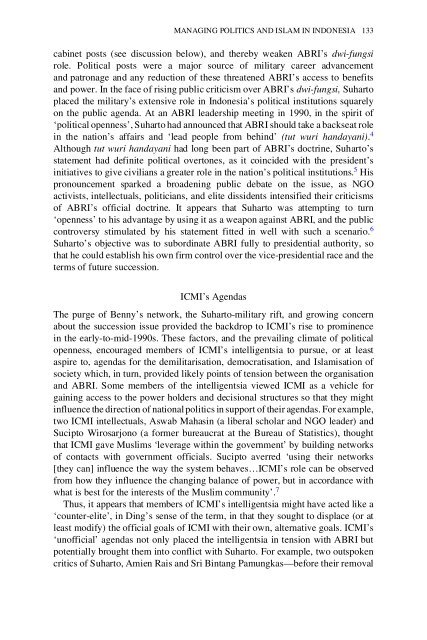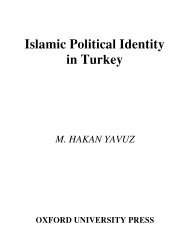You also want an ePaper? Increase the reach of your titles
YUMPU automatically turns print PDFs into web optimized ePapers that Google loves.
MANAGING POLITICS AND ISLAM IN INDONESIA 133cab<strong>in</strong>et posts (see discussion below), <strong>and</strong> thereby weaken ABRI’s dwi-fungsirole. Political posts were a major source of military career advancement<strong>and</strong> patronage <strong>and</strong> any reduction of these threatened ABRI’s access to benefits<strong>and</strong> power. In the face of ris<strong>in</strong>g public criticism over ABRI’s dwi-fungsi, Suhartoplaced the military’s extensive role <strong>in</strong> <strong>Indonesia</strong>’s political <strong>in</strong>stitutions squarelyon the public agenda. At an ABRI leadership meet<strong>in</strong>g <strong>in</strong> 1990, <strong>in</strong> the spirit of‘political openness’, Suharto had announced that ABRI should take a backseat role<strong>in</strong> the nation’s affairs <strong>and</strong> ‘lead people from beh<strong>in</strong>d’ (tut wuri h<strong>and</strong>ayani). 4Although tut wuri h<strong>and</strong>ayani had long been part of ABRI’s doctr<strong>in</strong>e, Suharto’sstatement had def<strong>in</strong>ite political overtones, as it co<strong>in</strong>cided with the president’s<strong>in</strong>itiatives to give civilians a greater role <strong>in</strong> the nation’s political <strong>in</strong>stitutions. 5 Hispronouncement sparked a broaden<strong>in</strong>g public debate on the issue, as NGOactivists, <strong>in</strong>tellectuals, politicians, <strong>and</strong> elite dissidents <strong>in</strong>tensified their criticismsof ABRI’s official doctr<strong>in</strong>e. It appears that Suharto was attempt<strong>in</strong>g to turn‘openness’ to his advantage by us<strong>in</strong>g it as a weapon aga<strong>in</strong>st ABRI, <strong>and</strong> the publiccontroversy stimulated by his statement fitted <strong>in</strong> well with such a scenario. 6Suharto’s objective was to subord<strong>in</strong>ate ABRI fully to presidential authority, sothat he could establish his own firm control over the vice-presidential race <strong>and</strong> theterms of future succession.ICMI’s AgendasThe purge of Benny’s network, the Suharto-military rift, <strong>and</strong> grow<strong>in</strong>g concernabout the succession issue provided the backdrop to ICMI’s rise to prom<strong>in</strong>ence<strong>in</strong> the early-to-mid-1990s. These factors, <strong>and</strong> the prevail<strong>in</strong>g climate of politicalopenness, encouraged members of ICMI’s <strong>in</strong>telligentsia to pursue, or at leastaspire to, agendas for the demilitarisation, democratisation, <strong>and</strong> <strong>Islam</strong>isation ofsociety which, <strong>in</strong> turn, provided likely po<strong>in</strong>ts of tension between the organisation<strong>and</strong> ABRI. Some members of the <strong>in</strong>telligentsia viewed ICMI as a vehicle forga<strong>in</strong><strong>in</strong>g access to the power holders <strong>and</strong> decisional structures so that they might<strong>in</strong>fluence the direction of national politics <strong>in</strong> support of their agendas. For example,two ICMI <strong>in</strong>tellectuals, Aswab Mahas<strong>in</strong> (a liberal scholar <strong>and</strong> NGO leader) <strong>and</strong>Sucipto Wirosarjono (a former bureaucrat at the Bureau of Statistics), thoughtthat ICMI gave Muslims ‘leverage with<strong>in</strong> the government’ by build<strong>in</strong>g networksof contacts with government officials. Sucipto averred ‘us<strong>in</strong>g their networks[they can] <strong>in</strong>fluence the way the system behaves…ICMI’s role can be observedfrom how they <strong>in</strong>fluence the chang<strong>in</strong>g balance of power, but <strong>in</strong> accordance withwhat is best for the <strong>in</strong>terests of the Muslim community’. 7Thus, it appears that members of ICMI’s <strong>in</strong>telligentsia might have acted like a‘counter-elite’, <strong>in</strong> D<strong>in</strong>g’s sense of the term, <strong>in</strong> that they sought to displace (or atleast modify) the official goals of ICMI with their own, alternative goals. ICMI’s‘unofficial’ agendas not only placed the <strong>in</strong>telligentsia <strong>in</strong> tension with ABRI butpotentially brought them <strong>in</strong>to conflict with Suharto. For example, two outspokencritics of Suharto, Amien Rais <strong>and</strong> Sri B<strong>in</strong>tang Pamungkas—before their removal




